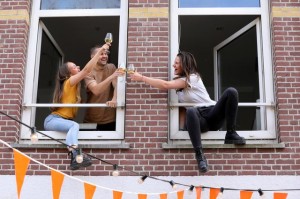The Netherlands has joined several European countries in announcing the easing of its coronavirus lockdown, outlining a four-month plan to phase out social restrictions if the virus remains under control.

The lifting of measures will begin next week and will be expanded in stages through Sept. 1, Dutch Prime Minister Mark Rutte said on Wednesday evening. He said the measures could be ramped back up, however, if there is a resurgence of infections.
If on the other hand the number of COVID-19 cases continues to fall, lockdown restrictions could be further lifted in September to include gyms, saunas, sex clubs, coffee shops and casinos, Rutte said.
The number of confirmed coronavirus cases in the Netherlands rose by 232 to 41,319 on Wednesday, with 36 new deaths for a total of 5,204, the National Institute for Health (RIVM) said in its daily update.
“We have made headway together, the figures are moving in the right direction,” Rutte said in a televised address. “The first outbreak phase is behind us… This is the phase of transitioning to a life of social distancing.”
“Steps to slowly open the economy and public life will give our country the space to look forward and make plans for the future. We will do that as quickly as possible, but it is better to be safe now than sorry later.”
Face masks will be compulsory on public transport from June 1, he said.
From next week, elementary schools will reopen, with classes split and rotated to enable greater distancing.
Beauty salons and hairdressers will also be allowed to reopen for customers who make appointments, and non-contact outdoor sports such as tennis will be permitted, the government said in a statement.
Cinemas, restaurants and cafes will be allowed to reopen for up to 30 people, but only if visitors are able to keep a distance of 1.5 meters (nearly 5 feet) from other customers.
Public transport will resume normal schedules from June 1, but with just a fraction of seats available to allow for social distancing. High schools will also reopen in June, followed by camping sites and vacation parks.
Reuters


Share your thoughts